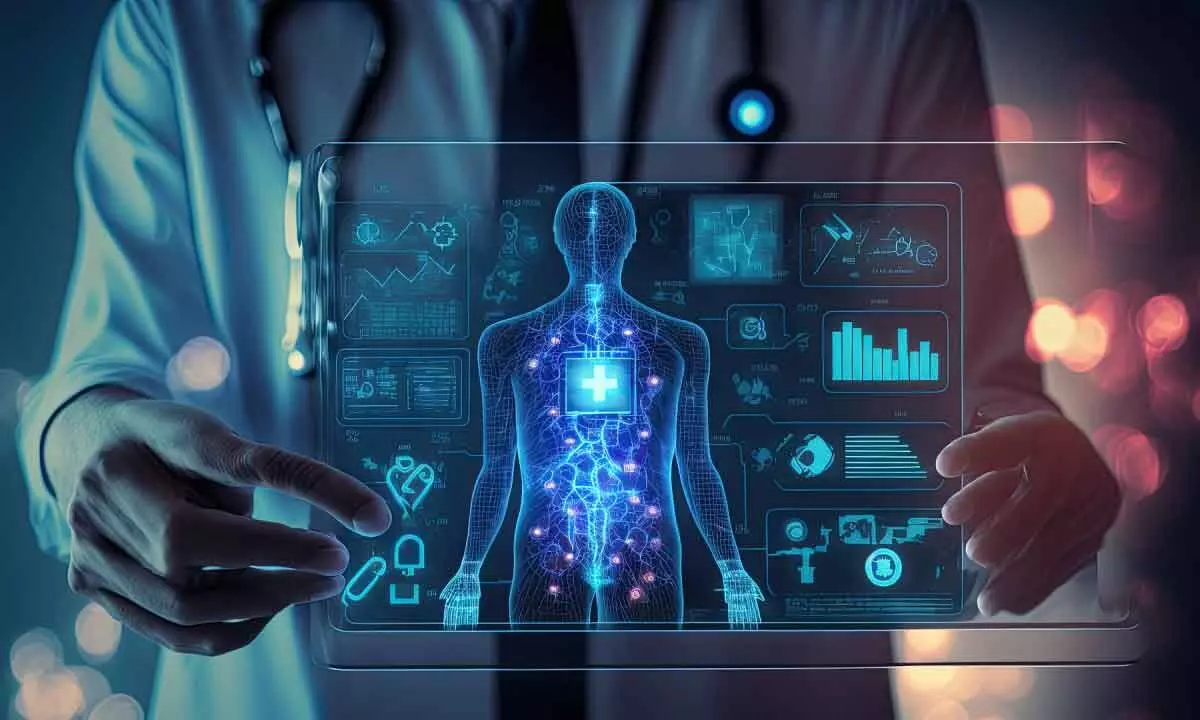Live
- IAS Officer Arvind Kumar's ED Questioning Concludes in Formula E Car Racing Case
- Jogulamba Gadwal Police Launch QR Code Feedback System to Enhance Public Services
- Microsoft Begins 2025 with Layoffs Amid Performance Reviews
- Kalam Inspirational Tour Empowers Students with Advanced Technology Insights
- TGSRTC Plans 6,432 Special Buses for Sankranti Festival Travel
- RG Kar tragedy: Verdict to be pronounced on January 18
- UP Woman Alleges Husband Allowed Friends to Rape Her for Money
- Hindi Diwas 2025: Speech Ideas for Students and Teachers
- World Hindi Day 2025: Celebrating Language, Culture, and Unity
- ‘Racharikam’ trailer promises high-stakes drama
Just In
The Role of AI in Diagnostics, Treatment, and Patient Care


AI’s introduction to healthcare has revolutionised patient care, diagnosis and treatment.
AI’s introduction to healthcare has revolutionised patient care, diagnosis and treatment. AI will introduce new tools and techniques while also enhancing areas such as drug discovery, disease diagnosis and operations. However, while introducing a plethora of positives there are a few challenges that might creep in. These challenges mostly revolve around data privacy and ethics and can be addressed via collaboration between various stakeholders within the healthcare system and strong policies to govern the introduction and implementation of AI in healthcare. This article will deal with all the positive changes brought in by the introduction of AI in healthcare along with its challenges.
AI will be bringing in a new wave of tools and techniques to improve the healthcare system such as:
1. AI powered diagnostic tools - are precise at studying pictures from CT scans, MRIs and X Ray to improve diagnosis of diseases such as cancers, heart and neurological diseases. These AI tools along with the expertise of medical professionals will increase the accuracy of disease diagnosis. These tools can identify minute patterns or anomalies in the scans which might be overlooked by the medical professional. Predictive geneticsthrough AI analyse the patient's history and genetic data as well, empowering medical practitioners to make better judgments. These tools are extensively being used by pathologists to study histopathological slides and interpret various manifestations of diseases.
2. Precision medicine - Currently the medications provided to patients are formulated based on studies and tests a generic set of people mostly belonging to a particular geographical area or race. Such one-size-fits-all medications tend to have a host of side effects and reduced efficacy. In order to make medication more effective and precise AI is being leveraged. AI helps understand a patient's response to medication and design a combination of drugs best suited for that particular patient and according to his/hers genetic composition.
3. Telemedicine - AI based chatbots and virtual assistants can help improve patient care in underserved areas of a country by providing accurate medical assistance for medication management, symptom monitoring, and initial patient assessments. Promoting a more inclusive and patient-centric healthcare. AI enabled wearable IOT devices can assist in providing accurate data to the medical practitioner.
4. Robotic Assistive Surgery -AI powered surgical robots help surgeons improve their accuracy and skill also reducing recovery time for major and minor surgeries. These bots improve accuracy and precision resulting in less invasive incisions, thus reducing recovery time.
While AI in genetics is indeed bringing in a positive wave of technological shift in healthcare it does come with certain drawbacks which are as follows:
1. Data and privacy - Since various levels of patient data will be collected to implement AI in healthcare, right from medical history to genetic composition. It is imperative that this data is secured by the strongest policies along with robust data protection infrastructure. This is only possible through transparent implementation of AI and trust between patients and healthcare professionals who understand the moral implications of insights produced by AI.
2. Regulatory framework- AI in healthcare calls for a strong regulatory framework to govern it. Another challenge that does arise is these regulations to catch up with the fast-paced evolution of the technology. There are chances of the regulations not being able to address new challenges that might crop up as the technology evolves. Thus there are concerns of balancing innovation with ethics.
3. Interoperability - A nationwide implementation of AI in healthcare can be a daunting task as healthcare organisations tend to use different systems and data formats, making the integration of a common AI in healthcare solutions difficult.
We can easily conclude that AI in healthcare is a complex task and not without its own complexity and challenges. Thus, it is important for technologists, healthcare professionals, policymakers, and ethicists to collaborate and improve patient care, disease diagnosis and detection.
(The writer is a Founder, Tagglabs)

© 2025 Hyderabad Media House Limited/The Hans India. All rights reserved. Powered by hocalwire.com






